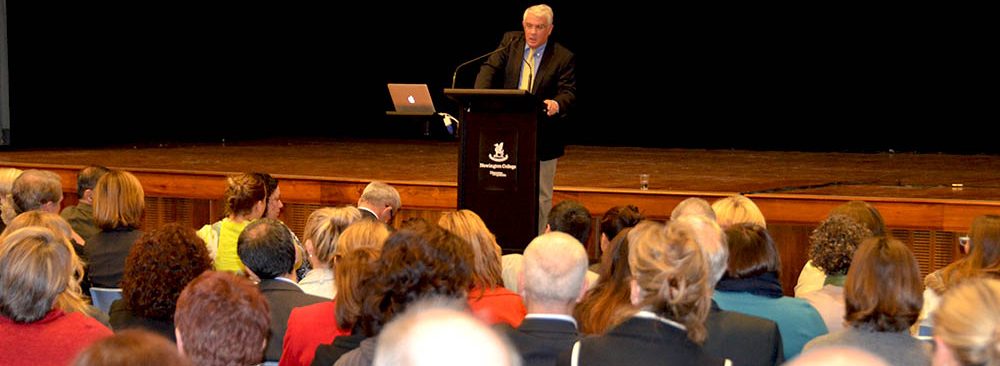Dr Michael Carr-Gregg tackles Mental Health at P&F Event
Teen psychologist Dr Michael Carr-Gregg is an exceptionally entertaining speaker but he left the 350 plus audience at Newington College, last Wednesday evening, in no doubt that his message is anything but fluffy or lightweight.
“Make sure your sons don’t believe they are their ATAR score!” he implored, opening the discussion on the psychological temperature of young people in Australia, and then quoted their three top concerns as:
• Coping with stress
• Coping with school
• Body image
Dr Carr-Gregg’s signature is delivering national and international evidence-based seminars to parents and teachers, to help collectively make a difference to the health and well-being of young people.
And the evidence isn’t good. We are in serious need of a change in the management of youth mental health. Suicide has now overtaken accidents (primarily motor vehicle) as the largest cause of death for young people aged 15-24 years (ABS 2012). This was not the case in 2000. One in four young people is living with a mental disorder and 9% of young people (16-24 years old) experience high to very high levels of psychological distress.
Newington College, through the Deputy Head of Stanmore (Students), Mr Bob Meakin, had specifically requested Mental Health be the topic of the presentation and Dr Carr-Gregg acknowledged it is a brave and well-informed school that approaches this topic head-on.
Dr Carr-Gregg described schools as “petri dishes in which psychological issues are manifesting and these children do not readily self-identify.
“They don’t really understand the difference between depression and sadness. As you would expect, young people have low emotional literacy”, he explained. “Without effective treatment they really do suffer.”
Recognising that communication can break down between parents and teenagers, during adolescence, is a realistic thing explained Dr Carr-Gregg. “Teenagers find their parents acutely embarrassing. It is not that they don’t like you, but more that they begin to see you through adult eyes. You’re no longer perfect.”
He understands therefore it may not be parents who can best help a distressed teenager. He believes we have to talk to kids about seeking alternative sources of information and help; to get first class counseling and even further, to tap into online resources.
A considerable part of Dr Carr-Gregg’s presentation was showing parents the logical connection between technology and access to expert mental health information. Sadly, the reality is that there is not the number of health professionals available to deal with the increasing mental health demands and so Dr Carr-Gregg has investigated, “how to harness the power of the Internet for good, when existing models of service can’t cope.”
“So what do we really want for our children? We want them to flourish!” And from here Dr Carr-Gregg spoke of studies, empirical evidence, practical approaches and a wealth of literature that is available on how to grow the positive emotions needed to inoculate our young people; ways to engage them in “flow” and experiences that see them lose themselves in a passion; ways to build relationships that harness a rich repertoire of friends and guard against the toxicity of loneliness; ways to find deeper meaning by serving a cause bigger than themselves and transcending the shallowness and disappointments of materialism; ways to build altruism not egoism from the get-go.
The Parents and Friends’ Association organise these forums for the Newington Community and each event is an excellent resource for families to begin conversations with their teenagers. This particular forum demonstrated that parents are best armed with preparation and prevention when it comes to mental health issues for young people—and that there is a wealth of good advice and practical assistance available in making our kids mentally fit all-rounders and game ready for the challenge of a good life.
Also in this issue see Reverend Williams’ Article : Building Resilience





